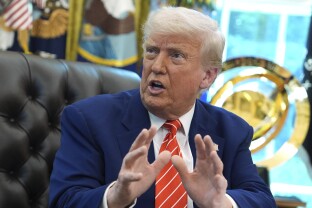The government’s human resources department, the Office of Personnel Management, is directing federal employers to keep employee demographic data secret.
In its new “Merit Hiring Plan” published late last week, OPM told agencies to “cease developing or disseminating information regarding the composition of the agency’s workforce based on race, sex, color, religion or national origin.”
The memo also requires new applicants to answer questions about how they’d advance President Donald Trump’s agenda, a move Democrats panned earlier this week as a “loyalty test.”
The administration’s guidance to nix demographic data collection “is inconsistent with Title XII principles,” Jenny Yang, a former chair of the Equal Employment Opportunity Commission, told NOTUS, pointing to the section of the Civil Rights Act that bars employment discrimination.
“It’s essential to have data to be able to assess whether qualified individuals of a particular background or otherwise are being excluded for reasons that aren’t job related,” she said.
“In order to prevent discrimination, which is what Congress intended, you need to be analyzing and collecting data so that you can determine if there’s sort of a red flag for a problem. Because without it, it’s like saying, ‘I’m not going to look under the hood.’”
Despite OPM’s new guidance against compiling data, there is still a decades-old EEOC directive requiring agencies to report demographic data called Management Directive 715. Agencies are also supposed to analyze data to “uncover, examine, and remove barriers to equal participation,” under that 2003 directive.
These reports have previously been used to identify barriers to women working in the Air Force and implement changes in parental leave policy and aircraft design, for example.
In response to questions about the apparent conflict, OPM said, “Agencies can report any required information to EEOC, that wouldn’t be ‘disseminating.’”
The agency also doubled down on its stance against demographic data collection. “Lumping people together in groups like ‘Asian/Pacific Islander’ and ‘Hispanic’ is demeaning and only perpetuates racial stereotyping,” it wrote, pointing to the Supreme Court from 2023 ruling against affirmative action.
The EEOC supported OPM’s directive in a statement to NOTUS. “While agencies are still required to report data to the EEOC pursuant to EEOC’s current regulations and guidance, agencies should follow the requirements of OPM’s memo and not publicly or internally disseminate workforce composition demographics,” the commission wrote. “The EEOC does not require federal agencies to post their MD-715 reports.”
Separately, the EEOC is currently collecting annual data from private employers and federal contractors on workforce demographics — sex, race and ethnicity specifically — but on a shortened timeline than in past years and without a nonbinary gender category option. The commission has delayed the collection of data it would normally be compiling on unions and school system staff.
OPM’s new 30-page “Merit Hiring Plan” also requires new applicants to answer a new set of questions about their commitment to Trump’s agenda.
Democratic Rep. Stephen Lynch called the questions a “loyalty test,” that would “degrade and politicize the services Americans need from their government” in a letter to OPM this week.
The four questions ask applicants to describe their “commitment to the Constitution” and explain how they would “improve government efficiency and effectiveness” and “advance the President’s Executive orders and policy priorities.”
The memo instructs applicants to certify that they did not use artificial intelligence to answer the questions — instruction that comes as Health and Human Services Secretary Robert F. Kennedy Jr. has come under fire after NOTUS discovered several apparent markers of AI in his “Make America Healthy Again” report.
The document also contained a number of citations to studies that don’t exist, as NOTUS first reported.
Critics say the new applicant questions prioritize loyalty to Trump rather than skills-based hiring.
“Law represents both Congress and the president and former presidents’ views on what our federal government should actually be doing. What you see in this hiring memo is a focus on this president’s statements, not on the law,” Max Stier, president of the Partnership for Public Service, told reporters about the hiring memo.
He added, “Loyalty is a preeminent value rather than capability and character.”
—
Claire Heddles is a NOTUS reporter and an Allbritton Journalism Institute fellow.
Sign in
Log into your free account with your email. Don’t have one?
Check your email for a one-time code.
We sent a 4-digit code to . Enter the pin to confirm your account.
New code will be available in 1:00
Let’s try this again.
We encountered an error with the passcode sent to . Please reenter your email.


